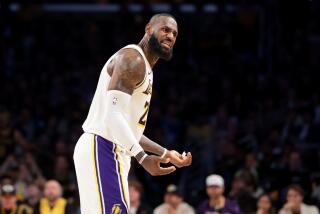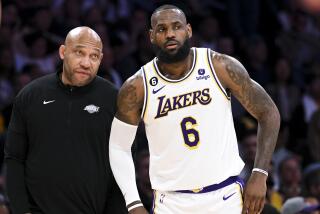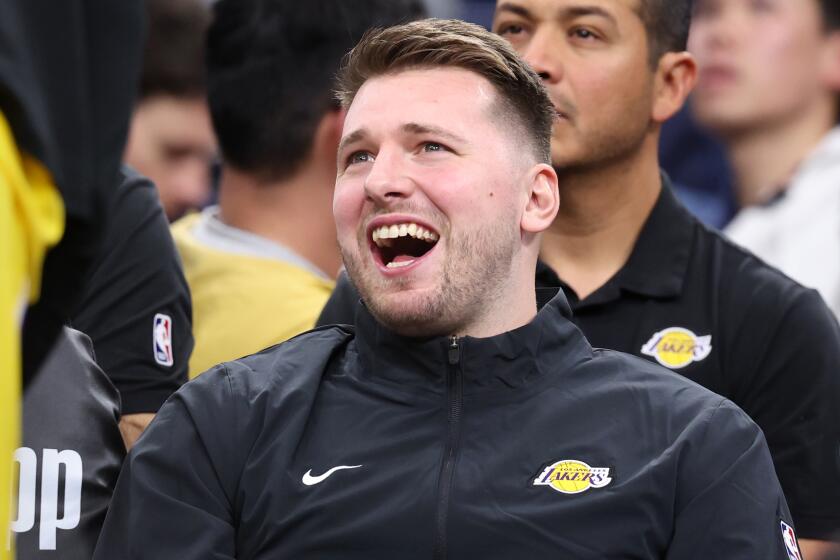Here’s Another Plea for NBA to Settle Lockout
- Share via
WASHINGTON — You know the first thought that came to my mind when I heard news of this Jan. 7 deadline, the so-called “drop dead” date, for the NBA and its players to negotiate a deal?
That both sides should, figuratively speaking of course, drop dead. OK, I know that’s not exactly an expression of Christmas spirit. But it does come in the spirit of the NBA and its players, who subscribe to their own twisted motto: It is better to receive than to give.
I love professional basketball more than any sport. Writing about it is my vocation; consuming it is my avocation. Christmas Day, those of us who care should have been in front of the television, alka seltzer in hand, watching Patrick Ewing and the Knicks visit Michael Jordan and the Bulls in Chicago. But there’s no joy to be had for professional basketball the rest of this season.
Even if these meetings in Los Angeles between David Stern and Billy Hunter produce an agreement, and league play begins the first of February, what kind of fraudulent season will the league hand us? Do they really think the sporting public will be thrilled to have a season full of injured players (because they can’t possibly get in game-shape so quickly after all this time off), hastily thrown together rosters, unabalanced schedules, and the virtually unavoidable second-rate play we’d be stuck with the first six weeks?
Isn’t it ironic that an entire league of women who wanted to play, for next to nothing in salary, find themselves with no vehicle now, without enough money to scrimp together a league while two sets of wealthy brats fight to their own demise (we should only hope) over several billion? Is it in bad taste that one of my Christmas wishes that the greediest agitators on both sides get their comeuppance?
Actually, I do have an idea of what to get the covetous millionaire who has everything: how about a conflict resolution expert?
I actually know one, an exceptional one, who resolves conflict for a living. Ken Hyatt is his name; he’s from right here in the D.C.-area and graduated from Sidwell Friends before attending Yale, then Harvard Law. His company, New York-based Conflict Management, Inc., has considerable worldwide experience in assisting organizations negotiate and manage conflict and critical relationships.
Actually, the NBA is relative small potatoes for CMI when you consider that Hyatt’s company trained many of the negotiators involved in the constitutional negotiations in South Africa between the former government and the African National Congress. You know one of CMI’s non-confidential clients? Try the World Bank. Xerox is another. So is General Motors. And Citibank. And the Boston Public Schools.
Hyatt, a huge NBA fan, wrote to both sides (Hunter and Patrick Ewing, Stern and Russ Granik) offering to help resolve this mess. Sports fans, and sportswriters for that matter, know nothing about labor conflict.
We know we want the games played, we have our opinions about who’s right and who’s wrong, but we don’t actually know what is happening.
Hyatt does. In his letter from Dec. 18, which began, “As the risk that we won’t see the NBA in 1999 increases, I felt compelled to write my thoughts to you,” he went on to make some fascinating obervations. He writes about the hazards of “positional bargaining” where each side argues why its position is fair while the other side’s is not. “This processs,” Hyatt writes, “often frames the negotiations as a contest of will, of power, of who has the leverage. This process, as you are all aware . . . tends not to create agreements that parties feel are legitimate, and tends to damage relationships and create distrust. Particularly given the constituencies you each represent--players and owners with great pride and competitiveness who love to win and hate to lose--your process carries significant risks--it might be better not to play than to back down to the other side.”
How accurate is that? That’s absolutely, positively what’s been going on here, why every bit of progress turns sour.
Hyatt, by the way, had made most of these observations months ago and could foresee much of what’s happened (or hasn’t happened.)
Hyatt offers detailed suggestions that have worked in countless negotiations, but most important, said that both sides should “look hard and objectively and the consequences of not reaching an agreement. I read a great deal about each side’s willingness to walk away from the season,” he said, “and assume that inaccurate perceptions of the other side’s resolve are impacting a willingness to compromise.
I would be curious to observe how long a conversation on the economic split goes without mention of willingness to walk.”
He also suggested that both sides consider “some kind of third-party assistance that does not involve the role of formal mediator.”
A few days ago, Hyatt said something that simply made sense. Why is it necessary to fight for a slightly larger peice of a pie which is decreasing in size every day this lockout lasts?
If this season is missed and all revenues are diminished, the percentage for which you fight to the death is worth less in absolute dollars than a slightly lower percentage (which could have been negotiated weeks ago) of a bigger pie.
Like Hyatt, professional negotiators look at the NBA/players squabble and laugh. They say it’s ego and nothing but ego that’s driving these talks over the cliff. Another person who could have helped resolve this conflict by now is Isiah Thomas, the only man we know of who has been a union president (as a player) and NBA owner/executive.
He’s a great human resource who has been, as far as I know, ignored. Thomas said back in October that egomaniacal behavior was killing these negotiations, and that he thought the season would eventually be cancelled. Thomas, now an NBC analyst, knows all the parties involved. He made his statements after great thought, with great certainty, and it looks like he’s right on the mark.
One thing that may force a season is veteran players, like Kevin Willis and Karl Malone, calling for a secret vote to accept or reject management’s latest proposal.
That would eliminate peer pressure from the richest players and the more vocal agents to stay with the union at all cost. Hunter has on national TV promised there would be a season. Let’s see how much he meant it.
All in all, it hasn’t been a good week for professional basketball in the U.S. We can only hope the WNBA absorbs many of those WBL players who this week were pushed into unemployment. But even then, the NBA will look like a predator.
If the two sides continue playing this stupid, harmful game of chicken through the first week of January, the WNBA’s slogan “We Got Next” may speak to the next professional league to actually play a game this year. What a country.
More to Read
Go beyond the scoreboard
Get the latest on L.A.'s teams in the daily Sports Report newsletter.
You may occasionally receive promotional content from the Los Angeles Times.










